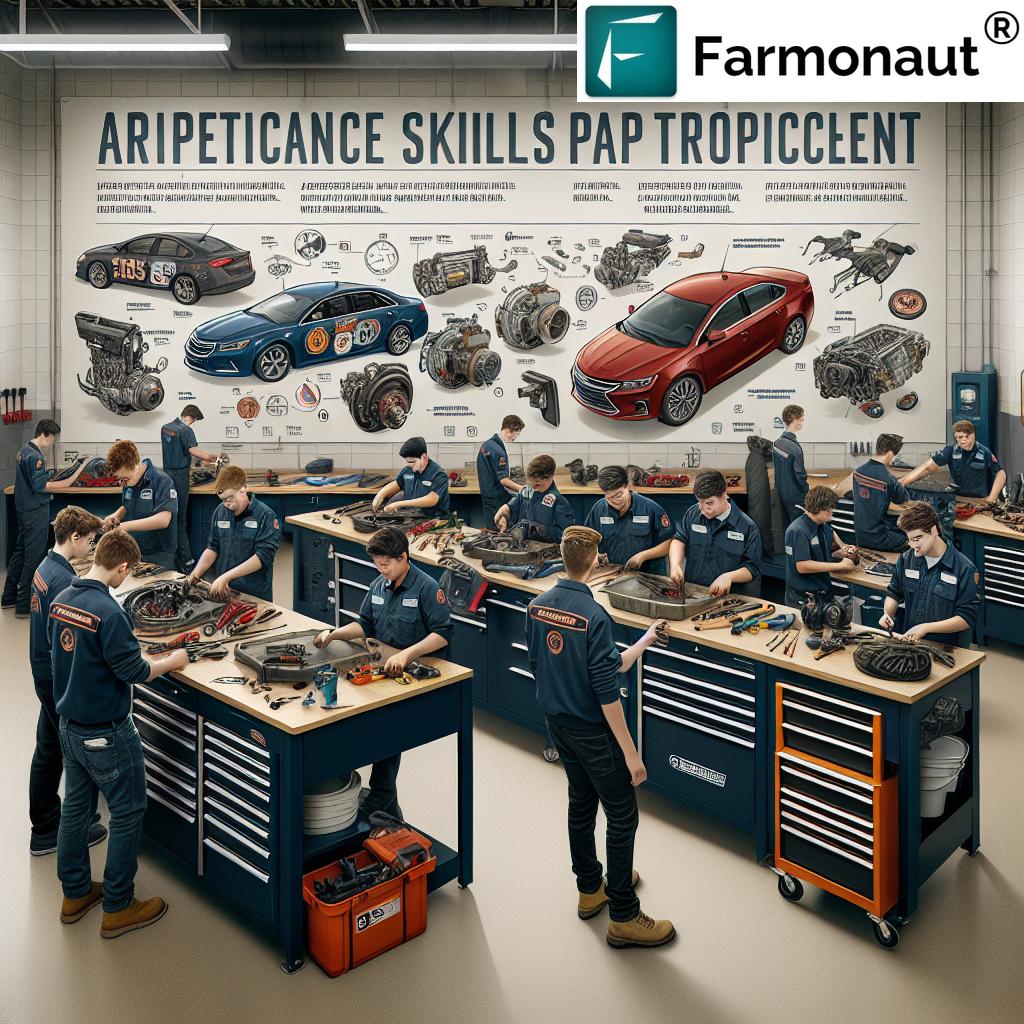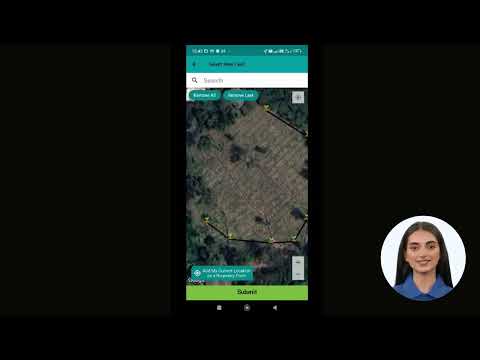6 Top Automotive Courses for Saskatchewan High School Students
“Over 1,200 Saskatchewan high schoolers enroll in automotive courses annually, gaining hands-on mechanical experience.”
Table of Contents
- Introduction
- Why Automotive Courses Matter for High School Students in Saskatchewan
- 6 Top Automotive Courses for Saskatchewan High School Students
- Comparative Course Overview Table
- Hands-On Learning Camps: Transforming Education
- Work Placements: Real-World Skills and Opportunities
- Blended & Distance Learning: Accessible Automotive Training
- Career Pathways: Exploring the Automotive Industry After Graduation
- Saskatchewan Polytechnic Certification & Apprenticeship Training
- Beyond Automotive: Mechanical Programs in Saskatchewan
- Farmonaut: Advanced Tools for Modern Agriculture & Fleet Management
- Frequently Asked Questions
- Conclusion
Introduction
Saskatchewan’s automotive industry continues to evolve—fuelled by innovation, technology, and a thirst for practical skills among high school students. With the Saskatchewan Distance Learning Centre (Sask DLC) experiencing unprecedented enrolment growth in mechanical and automotive programs (more than 400 students registered for the 2024-25 school year—triple last year’s number), the province is fast becoming a national leader in hands-on technical education. This article guides you through the top six automotive courses for high school students in Saskatchewan, exploring practical experiences, blended learning, and incredible career options in the automotive industry.
We’ll also highlight opportunities beyond the classroom—such as immersive hands-on learning camps for students, industry-driven work placements for high school students, and certification avenues like apprenticeship training for students. As we explore, you’ll also discover how platforms like Farmonaut empower students and future professionals in agriculture and mechanical fields through precision technology, blockchain traceability, and fleet management.
Why Automotive Courses Matter for High School Students in Saskatchewan
The automotive and mechanical sectors in Saskatchewan are critical industries, offering diverse career options and significant economic value. As automation, green technology, and electronic systems revolutionize automobiles, the demand for skilled technicians, mechanics, and engineers is at an all-time high.
For high school students, enrolling in automotive training programs opens numerous doors:
- Early exposure to mechanical concepts and diagnostic technology
- Hands-on learning camps for students to bridge theory and practice
- Work placements for high school students — real-world experience that enhances employability
- Potential to earn high school credit for work placement
- Ability to explore career options in automotive industry or transition into related fields such as agriculture equipment, power engineering, and more
In this strongly supportive environment, Saskatchewan’s students gain practical skills, build professional contacts, and confidently chart their future—whether pursuing post-secondary education or direct entry into high-demand trades.
6 Top Automotive Courses for Saskatchewan High School Students
Let’s dive into the standout offerings available through the Sask DLC—each designed to provide a blend of technical theory, hands-on experience, and clear pathways to further training and employment across the province.
“Saskatchewan offers 6 specialized automotive programs, preparing students for over 15 different automotive career paths.”
1. Mechanical and Automotive 10
As the first step in many students’ technical journeys, this introductory automotive course for high school students covers automotive fundamentals, vehicle systems, basic maintenance procedures, and shop safety.
- Offers a mix of online learning and scheduled hands-on lab work.
- Teaches essential mechanical skills such as tool usage, tire changes, fluid checks, and brake basics.
- Ideal for exploring interest in mechanics and building a strong foundation for advanced coursework.
2. Automotive Systems 20
Delve deeper into vehicle electrical, braking, suspension, and steering systems with a course aligned to industry standards.
- Blends rigorous online theory with required work placement or in-person laboratory components.
- Prepares students for diagnosing and servicing common mechanical issues, employing automotive-specific technology and equipment.
- Emphasizes critical thinking, troubleshooting, and safe work practices.
3. Autobody 20
Perfect for students interested in autobody repair and refinishing, this program focuses on restoring vehicle frames, repairing collision damage, and learning advanced painting techniques.
- Hands-on work in real or simulated autobody shops, closely supervised by instructors or industry professionals.
- Key skills include dent repair, welding, surface preparation, and paint blending.
- Preparation for further trade certification or direct employment in autobody shops.
4. Mechanical and Automotive 30
This advanced-level course supports students as they develop industry-level proficiency and leadership in shop settings.
- Requires completion of earlier levels (10/20).
- Emphasizes complex diagnostics, overhauls, advanced electrical and engine systems, plus workplace professionalism.
- Features extensive work placements for high school students and potential mentorship from experienced technicians.
5. Autobody 30
A culmination of autobody training, this specialty course is designed for students intent on entering the sector with practical experience and strong portfolio pieces.
- Students tackle advanced repair, welding, refinishing projects, and may participate in competitions.
- Opportunities to connect with local autobody shops and apprenticeship programs.
- Preparation for Red Seal or Saskatchewan apprenticeship exams.
6. Introduction to Mechanical and Automotive Theory
This flexible, theory-focused course is perfect for those starting out or exploring mechanical programs in Saskatchewan without ready access to a physical shop.
- Entirely online, ideal as a gateway to future hands-on opportunities with the DLC or in local schools.
- Ideal for rural students or those juggling commitments who want foundational knowledge.
- Completion can count as a prerequisite for more advanced or blended courses.
Comparative Course Overview Table
| Course Name | Offered By (Institution) | Hands-on Component | Estimated Duration | Skills Learned | Career Pathways | Enrollment Requirements |
|---|---|---|---|---|---|---|
| Mechanical and Automotive 10 | Sask DLC | Yes (~40%) | 18–20 weeks |
|
Entry-level mechanic, technician assistant | Open to grades 10–12 |
| Automotive Systems 20 | Sask DLC | Yes (~50%) | 18–20 weeks |
|
Mechanic, parts technician | Completion of level 10 |
| Autobody 20 | Sask DLC | Yes (~60%) | 18–20 weeks |
|
Autobody apprentice, shop worker | Grade 11+, prior coursework recommended |
| Mechanical and Automotive 30 | Sask DLC | Yes (~60%) | 18–20 weeks |
|
Journeyperson, shop lead, apprentice | Completion of 10/20 levels |
| Autobody 30 | Sask DLC | Yes (~70%) | 18–20 weeks |
|
Autobody technician, Red Seal apprentice | Completion of Autobody 20 |
| Introduction to Mechanical and Automotive Theory | Sask DLC | No (theory only) | 6–10 weeks |
|
Prerequisite for practical courses | None |
Hands-On Learning Camps for Students: Education Beyond the Classroom
At the heart of automotive training programs in Saskatchewan are the hands-on learning camps for students—which bring over 400 high schoolers together at the Sask Polytechnic Saskatoon campus each year. These one-day events allow us as students to work directly with industry-standard equipment, guided by professional engineers and technicians.
- Access to specialized workshops, simulators, and live demonstrations
- Networking opportunities with industry professionals and post-secondary instructors
- Students earn up to six credit hours toward their placement or certificate requirements
- Exposure to sectors such as autobody, electrical systems, diagnostic technologies, and advanced mechanical repair
These learning camps help demystify the workplace and provide valuable insights into career options in automotive industry and related trades.
Sample Activities:
- Conducting engine diagnostics and interpreting scan tool readings
- Practicing tire changes and undercarriage inspections
- Shadowing professional technicians during real repair projects
- Interactive Q&A sessions with automotive service managers
Work Placements for High School Students: Building Real-World Skills
One of the defining features of Sask DLC’s mechanical programs in Saskatchewan is their deep integration with the local automobile sector. Over 186 high school students are currently completing work placements with local businesses (including member dealers of the Saskatchewan Automobile Dealers Association).
Why Are Work Placements Important?
- Connect classroom theory to real shop practice, boosting job-readiness
- Enable key industry contacts and mentorship relationships
- Let students log practical hours needed for apprenticeship and certification pathways
- Allow us to test out different roles—such as service technician, parts specialist, or autobody assistant
For example, in 2023-24, 126 students completed over 4,500 hours in placements through Sask DLC’s automotive/ mechanical courses, gaining experience that goes directly onto their resumes.
Curious about wider industry work? Many courses offer overlapping pathways with welding, construction, agriculture equipment, and more—giving us broad career options across sectors.
Want to explore advanced resource and fleet management for automotive equipment or local dealerships? Check out the
Farmonaut Fleet Management solution—designed for operational efficiency, safety, and reduced costs in managing agricultural and automotive machinery fleets.
Blended Learning Automotive Courses: Flexible, Accessible, Effective
Accessibility is a key benefit of distance learning for automotive courses in Saskatchewan. Through the Sask DLC’s blended programming, students from across the province—including in remote or rural communities—can participate in high-quality automotive courses for high school students, combining online theory with in-person practicums or work placements.
- Advance at your own pace while continuing other academic courses.
- Attend learning camps, industry site visits, or extended shop placements at local businesses.
- Benefit from online feedback, digital lab simulations, and instructor-led group sessions.
Blended learning automotive courses help meet the requirements for apprenticeship training for students or to earn high school credit for work placement.
Planning to automate agricultural data collection, crop health monitoring, and compliance reporting for future farm equipment management roles? Test-drive the
Farmonaut Large Scale Farm Management platform—accessible via browser, Android, and iOS for efficient oversight and analytics.
Career Options in Automotive Industry for High School Graduates
What can graduates of these automotive training programs expect for their future? Saskatchewan’s booming automotive and mechanical sectors offer a wide range of job opportunities for skilled graduates, with many employers seeking new talent each year.
- Automotive Service Technician (dealerships, independent shops, fleets)
- Autobody Repair Technician (collision repair, painting, refinishing)
- Parts Person/Advisor (logistics, inventory, retail supply)
- Transportation Equipment Installer (specialty vehicles, upfitting)
- Heavy Duty Mechanic (transport trucks, agricultural equipment)
- Service Writer/Advisor (dealership service desks)
- Welding/Metal Fabrication (progression from autobody, construction sectors)
- Pathways to Post-secondary: Diploma, Certificate, or Apprenticeship training for students
The province’s strong interest and growth in mechanical and automotive employment means high school graduates—backed by industry-validated experience, practical hours, and connections—are well positioned for secure, in-demand careers.
Saskatchewan Polytechnic Certification: A Gateway to the Trades
Many high schoolers choose to extend their studies at Saskatchewan Polytechnic, which offers advanced Automotive Service Technician certificate and apprenticeship pathways. These industry-aligned programs:
- Support students who have earned credit toward placement requirements through high school work placements
- Allow us to build on prior learning, shortening the path to Red Seal or journeyperson credentials
- Open doors to specialized areas such as engine performance, powertrain diagnostics, hybrid/electric vehicles, and automotive electronics
The Sask Polytech campus regularly hosts on-site camps, information events, and tours for high school students, letting us see the facilities, meet faculty, and plan our future educational steps.
More Than Cars: Mechanical Programs in Saskatchewan
The Sask DLC supports a holistic approach to mechanical training—offering students work placements not only in automotive but also in:
- Welding: Skills for fabrication, repair, and assembly used in manufacturing, autobody, and construction sectors
- Construction: Pathways into carpentry, heavy equipment, electrical, and renovation fields
- Agriculture Equipment & Precision Agriculture: Experience with the newest GPS-equipped tractors and combines, or hands-on in barn repair and field operations
- Power Engineering: Managing boilers, turbines, or energy systems across industries
- Tourism & Service Sectors: Mechanical support roles for hotel, resort, tourism vehicles and equipment
Students and parents can register for upcoming courses and learn more at saskdlc.ca, or by speaking with their local school administrator or guidance counsellor.
Need blockchain-based crop traceability or agricultural data transparency for projects or future business? See
Farmonaut Product Traceability—ensuring secure, trusted farm-to-fork records.
Farmonaut: Advanced Tools for the Next Generation of Automotive & Agricultural Professionals
At Farmonaut, we understand the power of data, technology, and practical insight in shaping the future of mechanical industries. Our solutions serve not only farmers and ranchers but also those managing fleets or embracing environmental responsibility in automotive or agricultural sectors.
-
Satellite-Based Crop Health Monitoring:
Multispectral imagery lets us make smarter decisions for equipment maintenance and resource use on large farms. -
Fleet & Resource Management:
Monitor and optimize vehicle/fleet operations—reducing costs and maximizing performance for agribusiness and automotive operators. Learn more. -
Carbon Footprinting:
Accurately track real-time emissions from vehicles, helping projects aiming for greener operations. Discover our carbon footprinting tools. -
API Integration:
Seamlessly access satellite and weather data for automotive or agricultural analytics, asset monitoring, and more. Try the Farmonaut API or view the API developer docs. -
Crop Loan & Insurance Verification:
For students interested in agricultural finance or agri-tech, our satellite-based verification improves lending reliability. See crop loan and insurance benefits.
All Farmonaut services are available via web, Android, and iOS apps—making us accessible wherever your studies or future work may take you.
FAQ: Automotive Courses for High School Students in Saskatchewan
Q1: How can I get started in automotive courses if my high school doesn’t have a shop?
A: Students can enroll via the Saskatchewan Distance Learning Centre (Sask DLC), which offers both online theory and in-person learning camps/work placements. Your guidance counsellor can help you register for blended courses designed for flexible learning across the province.
Q2: Do work placements for high school students count towards apprenticeship or certification?
A: Yes. Many work placements arranged through Sask DLC count as credit hours toward placement requirements. These hours are recognized by industry employers and postsecondary programs, supporting your transition to employment or advanced certification.
Q3: What career options exist after I complete high school automotive programming?
A: You can pursue roles such as service technician, autobody assistant, parts specialist, or even enter related fields like agriculture equipment, welding, or construction. Some students continue into apprenticeship training for students at institutions such as Saskatchewan Polytechnic.
Q4: Can rural students participate in hands-on learning and camps?
A: Absolutely. Hands-on learning camps for students and blended course components are designed to be accessible provincewide, offering travel support or local arrangements where needed.
Q5: What are the prerequisites for advanced courses (30-level)?
A: Typically, completion of lower-level (10/20 or Autobody 20) courses is required to build foundational knowledge and safety skills. Your school counsellor can provide personalized advice.
Q6: Where can I register for these programming options?
A: Visit saskdlc.ca or speak directly with your local high school’s administrator or guidance office to register for automotive, mechanical, and blended courses.
Q7: Can these courses lead to university or college credits?
A: While primarily counted as high school credits, completion of these rigorous programs positions you for advanced entry into certificate, diploma, or apprenticeship tracks at post-secondary institutions, especially if you pursue further studies at Saskatchewan Polytechnic.
Q8: How is Farmonaut relevant to students pursuing automotive and mechanical careers?
A: Farmonaut equips the next generation with advanced technological tools (satellite data, fleet management, carbon tracking) highly valued in modern industry—especially for those aiming to work in agri-tech, farm equipment service, logistics, or environmentally focused roles.
Conclusion
Saskatchewan’s thriving automotive courses for high school students have made the province a leader in practical, industry-ready education for our youth. Through the Saskatchewan Distance Learning Centre and post-secondary pathways at Sask Polytech, hundreds of students develop the mechanical skills, professional contacts, and work placement hours that launch successful careers.
From autobody and automotive systems to welding, construction, and advanced agricultural equipment maintenance, these programs empower high school students across Saskatchewan—preparing us for more than 15 different career options and a future shaped by technology, innovation, and sustainable growth.
For those of us inspired to lead the future—whether in the diagnostic bay, the workshop, the tractor cab, or the data analytics office—these programs and the latest tech advancements (such as Farmonaut’s carbon footprint monitoring, fleet management, and large-scale resource management tools) provide the tools to excel.
Are you ready to ignite your mechanical future? Begin your journey today—enroll, engage, and explore the limitless opportunities waiting in Saskatchewan’s dynamic automotive and mechanical training landscape.
Join Saskatchewan’s next generation of innovators—drive your future, expand your horizons, and be the change in the world of automotive and mechanical excellence!








